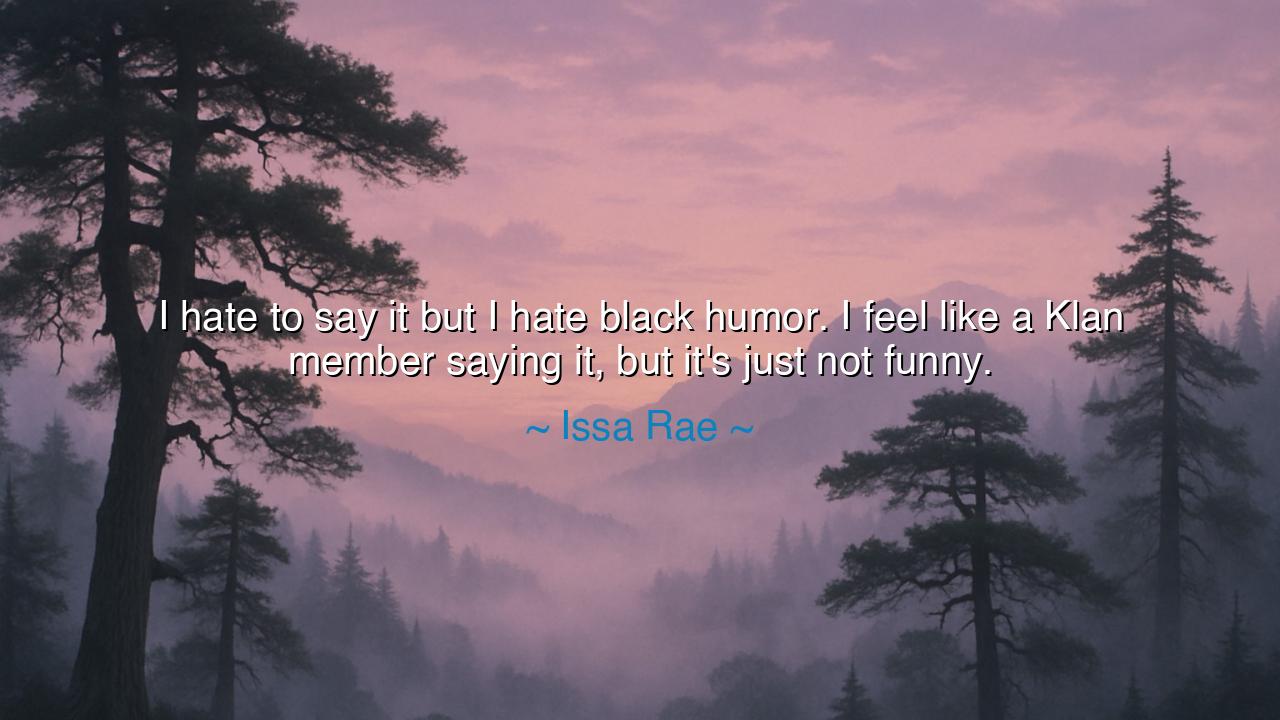
I hate to say it but I hate black humor. I feel like a Klan
I hate to say it but I hate black humor. I feel like a Klan member saying it, but it's just not funny.






Hear, O seekers of truth and conscience, the voice of Issa Rae, a creator of vision and vulnerability, who once declared with bold honesty: “I hate to say it but I hate black humor. I feel like a Klan member saying it, but it’s just not funny.” Though her words strike like lightning—sharp, uncomfortable, and raw—they illuminate a great moral struggle beneath the laughter of the age. For she speaks not merely of taste in comedy, but of the weight of laughter, of the fine line between humor and harm, and of how the spirit must discern what it chooses to find amusing.
In her confession lies both pain and courage. Issa Rae, a voice of her generation, does not reject humor itself but challenges a particular kind—“black humor,” not in the sense of race, but of darkness, of jokes that draw strength from cruelty, despair, or suffering. She admits her discomfort with it, even as she feels the pressure of guilt for doing so. When she says she “feels like a Klan member,” she exposes the paradox that haunts the modern heart: to reject what others find liberating may feel like betrayal, yet to accept what feels wrong is to betray oneself. Thus, her words reveal the eternal battle between conscience and conformity—between the laughter that frees and the laughter that wounds.
The ancients, too, understood this conflict. In the days of Aristophanes, laughter was wielded as both a weapon and a mirror. The playwright mocked tyrants and philosophers alike, exposing hypocrisy through wit. Yet even he warned of the danger of humor without heart, for such laughter becomes poison to the soul. True comedy, he taught, must elevate, not degrade; it must cleanse through insight, not corrode through cruelty. Issa Rae’s reflection is born of this same lineage: she recognizes that not all laughter is innocent, and that some jokes, though wrapped in cleverness, rot the moral sense from within.
In the modern world, “black humor” often celebrates irony and darkness, finding comedy in tragedy. It can serve as a shield—a way to cope with despair by turning pain into jest. Yet Issa Rae reminds us that this shield can cut both ways. What begins as coping can become cynicism, what begins as bravery can curdle into numbness. To laugh at everything is not strength; it can be surrender. There is wisdom in knowing what not to laugh at, for every chuckle shapes the soul. The laughter of cruelty is the echo of indifference; the laughter of compassion is the sound of healing.
Consider the tale of Diogenes, the ancient cynic who mocked the conventions of his city. Though his humor shocked and scandalized, it was born of truth—he laughed not to demean, but to awaken. But imagine, instead, those who laughed at the suffering of others in the Roman arenas, finding joy in blood and spectacle. Their laughter was dark indeed—a symptom of spiritual decay. So, too, does Issa Rae’s rejection of black humor carry the weight of a moral awakening. She refuses to laugh at despair, because she knows that to do so would make her complicit in it. Her honesty, though uneasy, is the mark of one who guards the sacredness of empathy.
Her discomfort also reveals something greater about art and identity. As a Black woman, Issa Rae has lived within the gaze of a world that often turns Black pain into entertainment. Her words challenge this cycle. She asks, in her way, must we always laugh through pain, or can we demand joy that is untainted by suffering? Her rejection of black humor is not rejection of her culture, but an act of love toward it—an insistence that laughter need not always rise from wounds. She seeks a comedy of healing, not of endurance; a humor that uplifts rather than reopens scars.
Thus, her words become not an admission of shame, but a declaration of integrity. To refuse laughter that dishonors life is an act of honor. The lesson, then, is clear: laughter is a sacred fire, and it must be tended wisely. Let us ask ourselves, before we laugh, whether our joy is born of understanding or mockery. Let us choose humor that enlightens, that connects, that restores our shared humanity. And if ever we feel uneasy, as Issa Rae did, let that discomfort guide us—it may be the whisper of our conscience reminding us that not all that is clever is good.
So, my children of wit and wisdom, carry this teaching with you: laugh freely, but not blindly. Honor the power of humor, but guard its purpose. The jest that mocks suffering is hollow; the jest that brings light to suffering is divine. And if ever you stand, as Issa Rae did, between laughter and silence—choose silence, for in that silence, you may find truth. For laughter without compassion is noise, but laughter born of empathy is music—the sound of the human spirit remembering its dignity.






AAdministratorAdministrator
Welcome, honored guests. Please leave a comment, we will respond soon